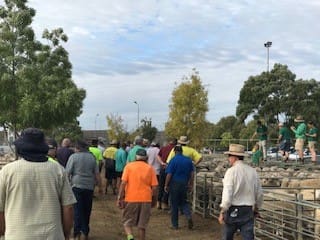
The smaller crowd at the Ouyen sale this week was indicative of coronavirus restrictions at many centres.
LIVESTOCK saleyards are being encouraged to stay open as they seek clarification of the sector’s status as an essential service during the coronavirus COVID-19 pandemic.
Australian Livestock Saleyards Association president Stuart Mclean said he had spoken with the Victorian Agriculture Department, some processors and PrimeSafe and the transport industry.
“The department is encouraging us to remain open, certainly PrimeSafe is and the processors are putting things in place such as split shifts.
“The anecdotal evidence is that the red meat trade in the retail sector has gone up 30-40 percent over the last two weeks,” he said.
“There is certainly a demand for meat and obviously we need to keep things rolling on.”
“We see the saleyard sector as an essential link in the red meat livestock marketing system and our feedback indicates that the broader industry supports the sector remaining open and operating to maintain food supply in the future,” Mr Mclean said.
“We are as an industry remaining open and operating.”
NFF wins assurance of saleyards as essential to ag supply chain
National Farmers Federation president Fiona Simson said the NFF this week had a number of conversations with Minister for Agriculture David Littleproud and the department secretary Andrew Metcalfe, and attended a number of forums representing agriculture including the agriculture minister’s meeting (Agmin).
“We raised the issue of saleyards and their continued operation and were assured by the ministers’ focus on these as an essential part of the ag supply chain.
“Although the minister and department secretary held no serious concerns about the operation of saleyards under the current guidelines, common sense precautions about social distancing, hygiene etc should always be followed.”
Saleyards need to take into account attendances
A Victorian Government spokesperson said legal directions have been issued which ban outdoor gatherings of 500 or more people, and on indoor gatherings of 100 or more people in Australia.
“Local councils and saleyard operators will decide on saleyard operations taking into account the number of people at sales, risks in their areas and supply chains.”
Mr McLean said the Federal Government’s ban on non-essential gatherings of more than 100 people indoors did not apply to work places and not to essential services.
“And also you have to have walls – so if you are holding a sheep sale under a roof or a cattle sale under a roof that is not indoors.
“But you must maintain the personal space distance and personal hygiene.”
Although some saleyards have limited attendance of sales to agents, buyers, saleyard staff, government officers and truck drivers, Mr McLean said all centres continue to provide access to their sites for the conduct of sheep and cattle sales.
“This is expected to continue in the future to ensure adequate food supply for retail outlets.”
ALSA has contacted its membership base and other saleyard industry stakeholders in recent days to determine the status of the sector as the COVID-19 outbreak progresses. The association said saleyards are encouraged to continue to discuss potential changes to their sale arrangements with local stakeholders (transporters, agents, buyers) as the government response unfolds. This may include additional measures to be undertaken on site.
Saleyard operations not under threat – ALMA
A statement on the Australian Livestock Markets Association website under the headline ‘Saleyard operations NOT under threat’ states that that “Given government information available to date we do not see the need for substantially altered saleyard practices and livestock sales should continue”.
ALMA executive officer Kate McGilvray said the association has discussed and was seeking legal advice on the status of saleyards sit as an essential service for the supply of food.
“Other than health, we believe food security is the highest priority and we believe we are a critical part of that.
“Certainly saleyards will be continuing from that perspective, although there are some variations in terms of operational conditions,” he said.
She said it is not a national position, but some saleyards were recording the names of people on site and limiting access to only essential people doing business.
She said at Forbes this week, the saleyard had a staff member at the gate signing people in and out, which is only operationally possible in some yards.
“Dubbo has gone for communication with all its stakeholders.”
ALMA has suggested that all people working or visiting saleyards maintain general hygiene and social distancing practices. These include:
do not visit saleyards if you are unwell
do not visit saleyards if it is not essential to do so
wash hands regularly with soap and water
avoid touching eyes, nose or mouth with hands
sneeze or cough into your elbow or clean tissue
do not shake hands
maintain a 1.5m distance from others
ALMA said some saleyards may also place limits/restrictions on entry including access only for those conducting essential business. Local saleyards should be contacted for specific information.

HAVE YOUR SAY